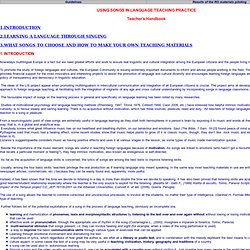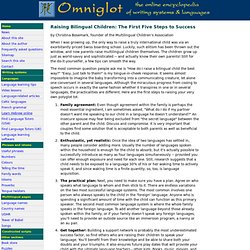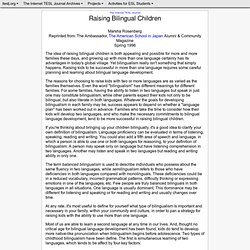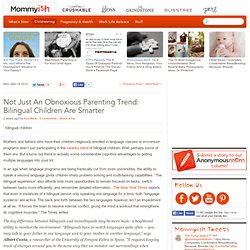

7 reasons why you should sing to learn languages. Languages & Integration through Singing. Teacher’s Handbook Nowadays multilingual is a fact but we need greater efforts and work to ensure real linguistic and cultural integration among the European citizens and the people living in neighbouring countries.

To promote the study of foreign languages and cultures, the European Community is issuing extremely important documents to inform and advise people working in the field. The European Commission provides financial support for the most innovative and interesting projects to assist the promotion of language and cultural diversity and encourages learning foreign languages among Europeans, following the policy of transparency and democracy in linguistic education. The ideas of the LIS project appear when promoting multilingualism in intercultural communication and integration of all European citizens is crucial.
The Great Myths of Language Learning. By: Rowland Jack Published: 20 July 2004 The British are bad at learning foreign languages.

It’s a fact. In any European city you can find intelligent and decent British tourists (among the dim and indecent) asking for the menu in English. At best they may mumble a few words learned from the phrasebook, only to receive a response in English from the harassed waiter. And it’s not only the tourists. But then there are two great myths of language learning. Bilingualism - Challenges and benefits to classroom performance (Lancaster University) This course has been approved by the BPS Learning Centre for the purposes of Continuing Professional Development (CPD).

The course is offered by the Lancaster University. Course information has been provided by Lancaster University. Languages - Your Say - Language and identity - Global English - Why do we have to always justify learning a language? Languages - Your Say - Language and identity. Myths about Bilingualism. I have had the chance to live and work for extended periods of time in at least three countries, the United States, Switzerland and France, and as a researcher on bilingualism, it has allowed me to learn a lot about my topic of interest. I have found that people in these countries share many misconceptions about bilingualism and bilinguals but that they also have very country-specific attitudes towards them. Among shared misunderstandings, one is that bilingualism is a rare phenomenon. In fact, it has been estimated that more than half of the world's population is bilingual, that is uses two or more languages in everyday life.
Another common misconception is that bilinguals have equal knowledge of their languages. Life as a Bilingual. Raising Bilingual Children: The First Five Steps to Success. By Christina Bosemark, founder of the Multilingual Children's Association When I was growing up, the only way to raise a truly international child was via an exorbitantly priced Swiss boarding school.

Luckily, such elitism has been thrown out the window, and now parents raise multilingual children themselves. The children grow up just as world-savvy and sophisticated -- and actually know their own parents! Still for the do-it-yourselfer, a few tips can smooth the way. The most common question people ask me is "How do I raise a bilingual child the best way? " Family agreement: Even though agreement within the family is perhaps the most essential ingredient, I am sometimes asked, "What do I do if my partner doesn't want me speaking to our child in a language he doesn't understand? " And, hey, remember, you're not alone. Www.lsadc.org/info/pdf_files/Bilingual_Child.pdf. Bilingual Kids Show Cognitive Advantages.
By Rick Nauert PhD Senior News Editor Reviewed by John M.

Grohol, Psy.D. on November 10, 2010 Children who know two languages tend to perform better than monolinguals on measures of attention and cognitive control. That is one of the findings in new research on bilingualism reviewed in the current issue of Psychological Science in the Public Interest, a journal of the Association for Psychological Science. Multi-tasking comes easier to bilingual kids. Credit: iStockPhoto WASHINGTON: Children who grow up learning two languages are better at multi-tasking but slower at building vocabulary than their monolingual peers, Canadian psychologists have found.

Publishing in Child Development this week, Raluca Barac and Ellen Bialystok from York University in Toronto tested a total of 104 six-year-old public school children, and compared the results of monolingual anglophones with their Chinese-English, French-English and Spanish-English counterparts. In a test of their ability to pay attention, plan, organise and strategise, the children were all asked to press a computer button while viewing images of either animals or colours. They all responded at the same speed when responses were limited to either animals or colours – but when asked to switch from animals to colours only, and press a different button, the bilinguals proved faster at making the changeover. Myths about Bilingualism. Rosenberg-Raising Bilingual Children. The Internet TESL Journal Marsha RosenbergReprinted from: The Ambassador, The American School in Japan Alumni & Community MagazineSpring 1996 The idea of raising bilingual children is both appealing and possible for more and more families these days, and growing up with more than one language certainly has its advantages in today's global village.

Yet bilingualism really isn't something that simply happens. Raising kids to be successful in more than one language requires some careful planning and learning about bilingual language development. The reasons for choosing to raise kids with two or more languages are as varied as the families themselves. Even the word "bilingualism" has different meanings for different families. If you're thinking about bringing up your children bilingually, it's a good idea to clarify your own definition of bilingualism. Not Just An Obnoxious Parenting Trend: Bilingual Children Are Smarter.
Mothers and fathers who have their children religiously enrolled in language classes or immersion programs aren’t just participating in the swanky trend of bilingual children.

Well, perhaps some of them are. But it turns out there is actually some considerable cognitive advantages to getting multiple languages into your tot. In an age when language programs are being frantically cut from even universities, the ability to speak a second language gives children sharp problem-solving and multi-tasking capabilities.
“The bilingual experience” also affords kids more opportunities to remain focused on tasks, switch between tasks more efficiently, and remember detailed information. The New York Times reports that even in instances of a bilingual person only speaking one language for a time, both “language systems” are active. The key difference between bilinguals and monolinguals may be more basic: a heightened ability to monitor the environment. (photo: Lasse Kristensen/Shutterstock) The Benefits of Bilingualism. SPEAKING two languages rather than just one has obvious practical benefits in an increasingly globalized world.

But in recent years, scientists have begun to show that the advantages of bilingualism are even more fundamental than being able to converse with a wider range of people. Being bilingual, it turns out, makes you smarter. It can have a profound effect on your brain, improving cognitive skills not related to language and even shielding against dementia in old age. Does Raising Bilingual Children Make Them Smarter ?